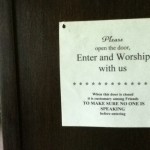I am reading a book called “Reading the Bible Again For the First Time: Taking the Bible Seriously But Not Literally,” by Marcus J. Borg.
I’ve just finished chapter 1, and my pulse rate is up. If I were somebody who took blood pressure medication, my doctor would be telling me this book was bad for me. I am agreeing with Borg. His religious feelings are in sympathy with my own, and his outlook on history and on the nature of truth seem not only dead-on accurate but obvious.
Yet Borg is presenting one side of a debate in our culture, and it seems to me to be the losing side.
Conflict about the Bible is the single most divisive issue among Christians in North America today. And because of the importance of Christianity in the culture of the United States, conflict about the Bible is also central to what have been called ‘the culture wars.’ … The conflict is between … a “literal-factual” way of reading the Bible and a “historical-metaphorical” way of reading it.
Maybe the fundamentalist side really is winning. Our president can get away with torture and treason and can send thousands of Americans to die in a pointless and ill-conceived war, and he’s still there because fundamentalists (most of whom are decent, moral, and loving people) keep voting for him because he supports Christian “values.”
Maybe it just seems like they’re winning because of my own history with them. I stopped calling myself Christian about 25 years ago after a summer program at a Christian community where the “literal-factual” way of reading the Bible was presented quite strongly. They convinced me that fundamentalists were correct in their interpretation of Christianity, but they also showed themselves pigheadedly ignorant about almost everything else. Most Christians, faced with such a realization, would leave the Church and start calling themselves atheist. I left the Church and called myself damned. I never stopped believing in G*d, but it was ten years before I found a door to the Divine that wasn’t barred and a communion that hadn’t been poisoned for me. And when I did, it sure as Hell wasn’t Christian.
So maybe I just feel like the Christians with a “historical-metaphorical” approach to the Bible are on the losing side because they already lost—I already lost—when the battleground was me.
OK. Deep breath. Let’s read on:
From [the fundamentalists’] point of view, allowing nonliteral interpretation opens the door to evading the Bible’s authority and making it say what we want it to say.
But, quoting from another author, L. William Countryman, “Biblical Authority or Biblical Tyranny?” :
These Christians imagine that the nature of biblical authority is perfectly clear; they often speak of Scripture as inerrant. In fact, however, they have tacitly abandoned the authority of Scripture in favor of a conservative Protestant theology shaped largely in the nineteenth century. This fundamentalist theology they buttress with strings of quotations to give it a biblical flavor, but it predetermines their reading of Scripture so thoroughly that one cannot speak of the Bible as having any independent voice in their churches.
I’m nodding here. In fact, I’m almost jumping up and down and shouting, “Yeah! Yeah! What he said!”
I’m a Quaker now, and as a Quaker I’m worshiping alongside Christians and I’m encountering the Bible as part of the milieu of spiritual writings that we read and discuss, and there’s some good stuff in it. But the Bible is a body of writings with life and breath, with seasons and moods, with hope and despair and poetry and mysticism, and when “Bible-based” Christians insist on the literal truth of every word, they kill it. And there’s just no way to tell them that.
There are some truths that language cannot contain. Words collapse under the weight of some meanings. I’ve known that for a long time, and the strategy I’ve developed for coping is: Stay centered, stay grounded, be real. Or as a Quaker might put it, Let your life speak. Borg identifies this as “postmodern”:
Postmodernity is marked by a turn to experience. In a time when traditional religious teachings have become suspect, we tend to trust that which can be known in our own experience. This turn to experience is seen in the remarkable resurgence of interest in spirituality within mainline churches and beyond. Spirituality is the experiential dimension of religion. … An obvious point that has often been forgotten during the period of modernity: metaphors and metaphorical narratives can be profoundly true even if they are not literally or factually true.
That’s me in a nutshell—my personal faith and practice in five simple sentences—and the first bit could just as well have been a quote from George Fox with the language updated and the thee’s and thou’s taken out. But trying to talk about spirituality to a fundamentalist is like walking into a crowded, lively room and discovering I’m a ghost. Scream, shout, wave my arms in front of people’s faces or walk right through them and they just won’t see me.
Last summer, at NEYM Sessions, I had the chance to dialog with hundreds of Quakers from all over the theological and political map, and it really seemed like a lot of the Christian-identified Quakers believe that if you’re not Christ-centered, you don’t have a center. Once in a while something like that gets stated explicitly. Jeanne over at Social Class & Quakers published a guest post by Bill Samuel in which he said:
I have a theory that the class homogeneity among liberal Friends is related to their lack of a clear spiritual center. It has been my experience among Christ-centered Friends and other Christ-centered churches that class is less of an issue, because the uniting factor is Jesus Christ. Without a clear, explicit uniting factor other than something like class, a group tends to gravitate towards becoming a club more united by socioeconomic and cultural factors.
And I want to say, “Lack of a clear spiritual center??? Excuse me??? Hello-oh!!! Sitting right here! In a meeting covered by an ocean of Light! In case anybody was wondering. Or paying attention. Or cared.”
In the midst of the conflict over NEYM’s relationship with FUM during Sessions last summer, Chris McCandless, the clerk of NEYM, said something along the lines of “Unity does not mean we are in agreement; unity means we are girded about by the bonds of love as we labor together.”
But how do you labor together with someone who is deaf and blind on all the wavelengths you use to communicate?
*sigh* I’m not actually as discouraged as this post makes it sound. The way you labor together is you worship together in gathered meeting, and when someone speaks, you listen not so much for the words as for the place the words come from. There’s a reason I’m Quaker.
Wow. All this just from reading chapter 1.











